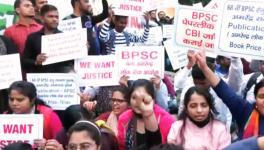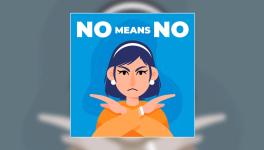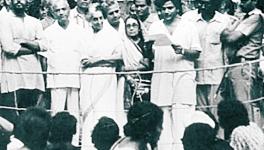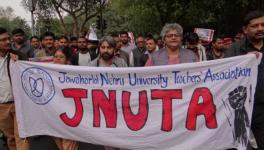JNU’s Internal Complaints Committee: A Mockery of Gender Justice!
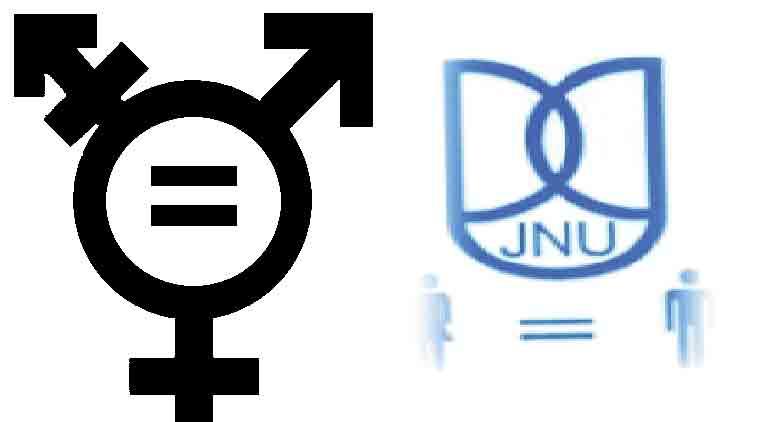
On November 22, the JNU ICC held a workshop, which was organised to create “awareness” among faculties, students, officers and staffs of JNU. A natural question may arise, why do the students and teachers always ‘complain’ about the administration when it is ‘thinking well’ for the university by taking up the question of gender so sincerely? In a similar tone, Prof. Ritu Gupta from National Law University, Delhi, a speaker of the event, appreciated the Vice Chancellor and said, “The VC has led an example in organising this timely workshop and has sat through the proceedings of this workshop”. JNU community, however, would differ from such views. But, why do we differ?
What was criminal about the ICC’s ‘Workshop on Sexual Harassment at Work Place’?
A student attending the workshop raised a crucial question, giving the disclaimer at the beginning that they held no allegiance to any political party. The question was, “How could the ICC be organising a workshop on sexual harassment while making a person the chief patron of the programme, against whom the same ICC is conducting an enquiry?” The student, then, quoted two relevant sections from the ICC Rules and Procedures.
Art 4(3): Persons in senior administrative positions in the HEI (Higher Educational Institutes), such as Vice-Chancellors, Pro Vice-Chancellors, Rectors, Registrars, Deans, Heads of Departments, etc., shall not be members of ICCs in order to ensure autonomy of their functioning, and
Art 8(4): The Executive Authority of the HEI shall act on the recommendations of the committee within a period of thirty days from the receipt of the inquiry report, unless an appeal against the findings is filed within that time by either party.
The student highlighted a clear conflict of interests between the two clauses. Referring to an ongoing case of sexual harassment pending against the VC in the Supreme Court, the student categorically stated, “This is not a hypothetical situation, there is indeed a case against the VC and the ICC itself was investigating the same.” The chair of the workshop Prof. Vibha Tandon, responded, “In such cases, the Executive Council will look into the same.” To these uncomfortable questions, the chair either gave a pathetic defence or brushed aside the student’s concerns.
The Sexual Harassment of Women at Workplace (Prevention, Prohibition and Redressal) Act, 2013 in its Article 2 (iv and v) mentions:
2. The following circumstances, among other circumstances, if it occurs or is present in relation to or connected with any act or behaviour of sexual harassment may amount to sexual harassment:-
(iv) interference with his/her work or creating an intimidating or offensive or hostile work environment for him/her;
or (v) humiliating treatment likely to affect his/her health or safety.
It is, thus, absolutely unjust and criminal where an accused of sexual harassment is being invited to a ‘gender awareness workshop’ as the chief patron. If we simply imagine a situation where the student who is fighting the case against a person in the position of power, would have wished to have attended the workshop, then will it not amount to humiliation which could affect the complainant’s health and safety? Is this not an absolute violation of the law?
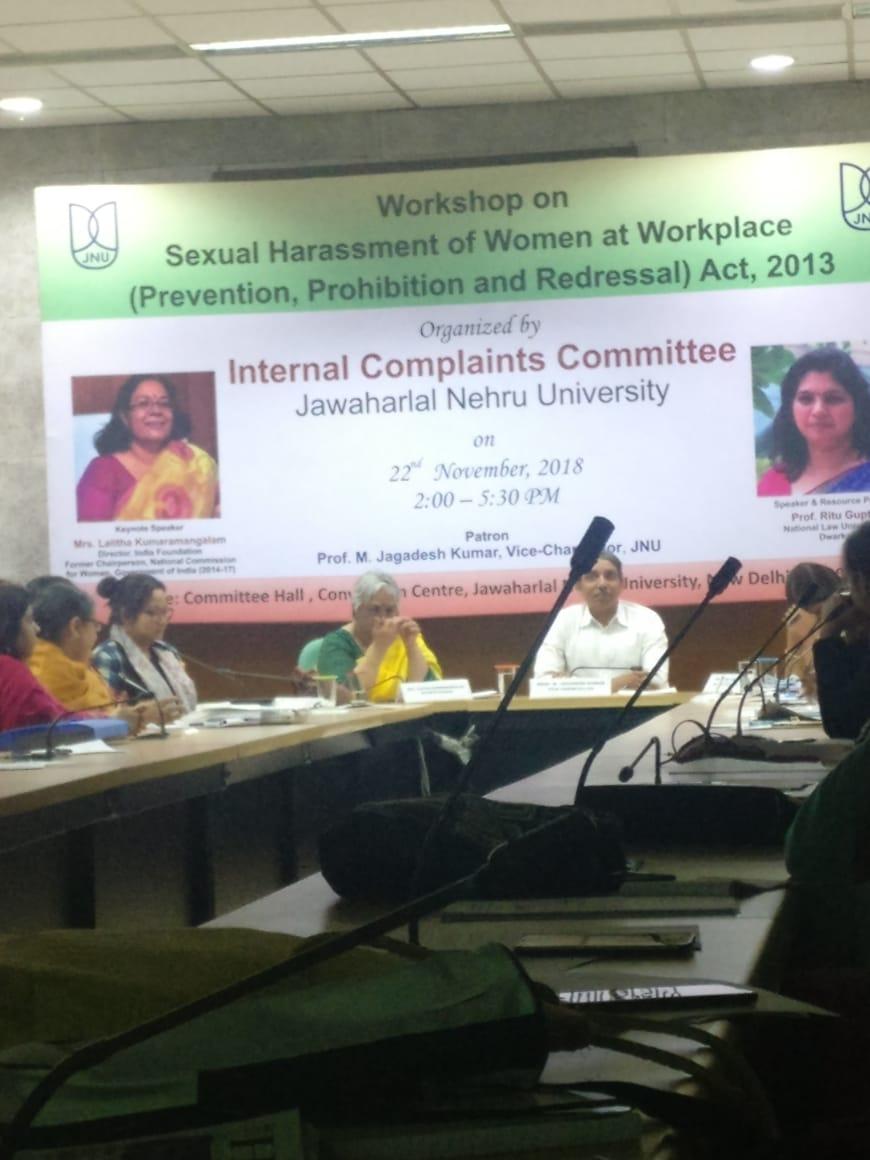
The workshop was conducted at a juncture when several accounts of sexual harassment by the survivors surfaced in social media through #MeToo campaign. The #MeToo campaign brought to light the failure of compromised institutions such as ICC, due to which the survivors had to resort to social media to speak up against sexual harassment that they had suffered from. There needs to be emphasis on strengthening the existing redressal mechanisms and to institute more such bodies with diverse representation to ensure transparency and impartial investigation. Such bodies must also take gender sensitisation programmes in a systemic and sincere manner. The administration-led ICC in JNU has clearly failed on both the tasks.
The Criminal Role of ICC in JNU:
The ICC in JNU was constituted replacing the GSCASH (Gender Sensitisation and Committee Against Sexual Harassment) on September 18, 2017, in an unconstitutional manner. Immediately after the autocratic formation of the ICC, the administration tried to access all the files of ongoing cases in the GSCASH forcefully. Amidst huge protests on several university level issues, a complaint was registered against the Vice Chancellor, Rector I et al.(information are accessed from public documents).
Although the complaint was initially registered with the GSCASH, the ICC took over the case. Ever since, the complainant has been subjected to retaliatory and vindictive acts by the JNU administration amounting to intimidation. Blocking of registration to multiple fake proctorial enquiries to denial of her MA degree, the JNU administration left no stone unturned. All these acts are gross violations of the 2013 Act, which are required to be followed to conduct a free and fair enquiry, where the complainant is made to feel comfortable and supported, not threatened and penalised.
In another instance, the ICC, breaching the confidentiality of the case, leaked the information in the media. The complainant was issued an obnoxious ‘warning’ by the ICC instead of giving confidence and support.
We also witnessed the notorious role of the ICC when eight women registered FIRs of sexual harassment against Prof. Atul Johri. When a huge wave of protest hit the streets of JNU and Delhi demanding immediate arrest of the accused, the ICC maintained criminal silence in order to shield Prof. Johri, instead of standing by the complainants. It was shameful that not even a statement was issued by the ICC demanding Johri’s removal from the administrative post let alone his arrest.
From the sequence of events, it is clear that the JNU ICC is not only regressive, but also constantly violating the law and the principle of gender justice. Besides, it lacks basic understanding on the question of gender. For instance, the circular by the Registrar on November 15, mentioned that the ICC workshop “can be attended by both genders.” This single instance shows the level of ignorance of the administration on the question of gender, as there is no place for any gender other than male and female in the administration-led “gender awareness workshop”.
The need of the hour, therefore, is to press for reinstating GSCASH in JNU and in other institutions politically and legally. So far, it has proved to be the most effective mechanism to undertake sensitisation programmes and work as an efficient and impartial redressal mechanism.
The JNU community will celebrate the day when it witnesses the administration taking up the question of gender justice sincerely, but it will protest as long as justice is denied and constitutional provisions are trampled upon. The question remains, what moral authority does the JNU ICC has to continue as a cell to address gender issues, when it fails to follow the law of the land by inviting and making a person accused of sexual harassment ‘patron’ to its “gender awareness programme”? And what moral authority does the VC have to be the head of the institution when it does not hit his conscience to resign from his position even after being accused of sexual harassment?
Get the latest reports & analysis with people's perspective on Protests, movements & deep analytical videos, discussions of the current affairs in your Telegram app. Subscribe to NewsClick's Telegram channel & get Real-Time updates on stories, as they get published on our website.











